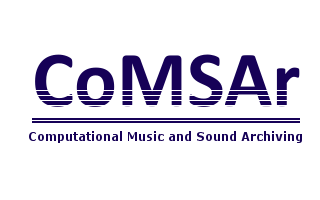International Symposium on Computational Ethnomusicological Archiving
Institute for Systematic Musicology
University of Hamburg, Dec. 07.-10.2017
How could existing digital technologies in the field of music information retrieval, artificial intelligence, and data networking be efficiently implemented with regard to digital music archives? How might current and future developements in these fields benefit researchers in ethnomusicology? How can analytical data about musical sound and descriptive data about musical culture be more comprehensively integrated?
Sound archives constitute an integral part of today’s information landscape. Only since the advent of sound recording has it been possible to preserve intangible cultural achievements, especially music, spoken word, as well as the orally transmitted bodies of knowledge of non-literate societies, and to make them available for scholarly investigation through specialized archives. Within the past two decades, an increasing number of institutional sound archives have initiated projects with the objective of transferring existing holdings from obsolete analog carriers into the digital domain.
While the digital technologies employed herein have seen steady progress, for instance in the field known as music information retrieval (MIR), the corresponding theoretical and methodological challenges with regard to effectively utilizing these large amounts of complex data in dealing with actual research questions have not hitherto been adequately addressed.
The epistemological gap between scientific-analytical research into musical sound and its structural features on the one hand, and humanistic-hermeneutical approaches to music as a culture-specific expressive form on the other raises a number of causative and non-trivial issues with regard to both the fundamental properties of musical sound as well as the elementary processes of musical meaning-making.
To advance digital sound archives beyond their current status as mere 'storage facilities' for the preservation of musical heritage towards their being full-fledged research tools, these issues have to be subjected to critical evaluation from the vantage points of different relevant disciplines.
The symposium's objective, therefore, is to bring together leading researchers and experienced practitioners from fields such as archiving and archival studies, computer science and signal processing, musicology, ethnomusicology, music theory, acoustics, and cognitive neuroscience, as well as practicing musicians from different parts of the world, thus encouraging genuinely multidisciplinary, trans-cultural intellectual exchange and collaboration.
A preliminary program will follow soon.
Christian D. Koehn
Curator
UHH Ethnographic Sound Recordings Archive
The Wilhelm Heinitz Collection of Traditional Music
University of Hamburg
Institute for Systematic Musicology
Neue Rabenstrasse 13, D-22354 Hamburg
+49 40 42838-4754


